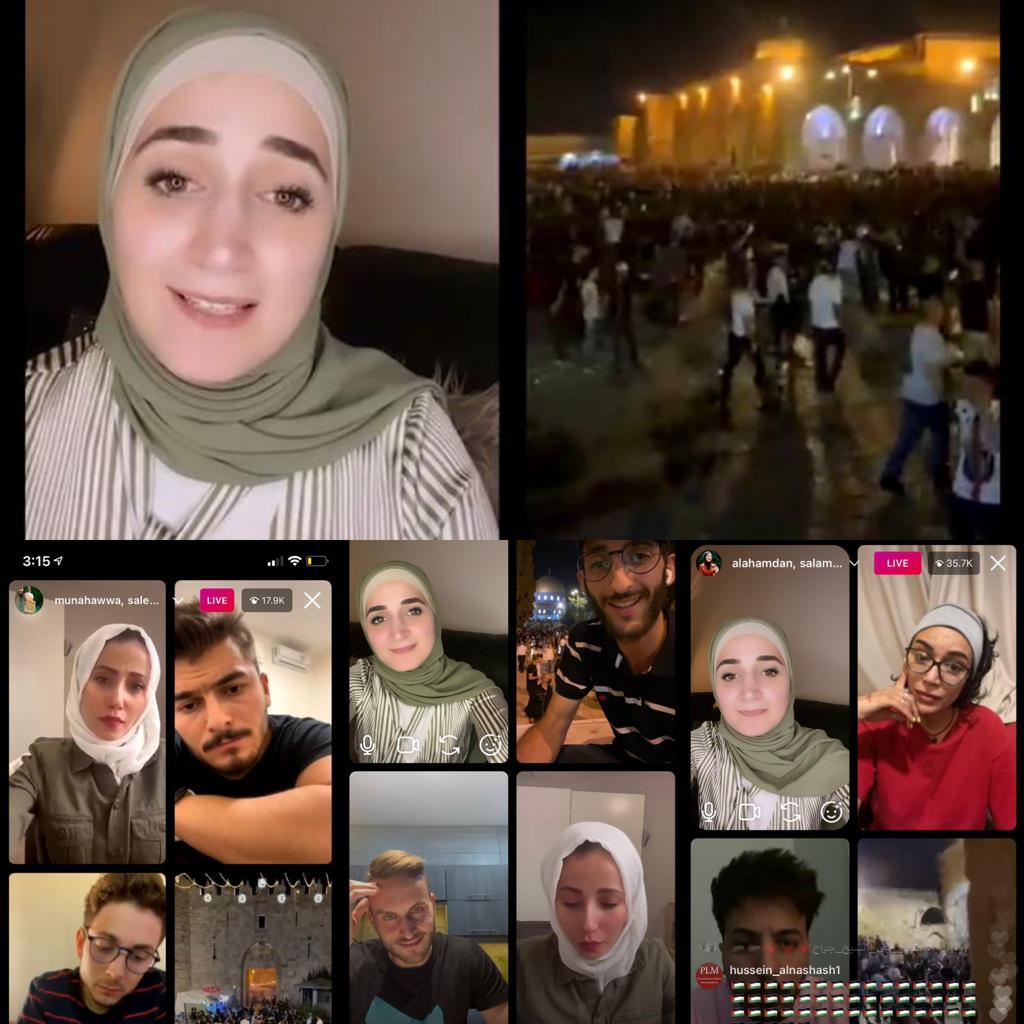بدأ الأمر على نحو غير متوقع. صحفي إسرائيلي يقول في ندوة عن الإعلام في وسائل التواصل "لو كانت شبكات التواصل الاجتماعي موجودة في ذلك الحين لما حدثت محارق النازية"، فردت مراسلة الجزيرة في فلسطين نجوان سمري: "ولو كانت شبكات التواصل الاجتماعي موجودة آنذاك لما حدثت النكبة". كانت اعتداءات الاحتلال الإسرائيلي على الفلسطينيين في حي الشيخ جراح بالقدس والمسجد الأقصى في الجمعة الأخيرة لتكون أكثر عنفًا لولا كاميرات الهواتف المحمول والبث الحي على شبكات التواصل الاجتماعي.
في ظاهرة لافتة، وربما في خطوة متقدمة على القنوات التلفزيونية المنشغلة بأجندات إخبارية مختلفة، قام ناشطون ومواطنون صحفيون بمشاركة بث حي ومفتوح لساعات، وثقت الانتهاكات الإسرائيلية في القدس. جاء ذلك في وقتٍ لم تعر فيه بعض القنوات أحداث القدس أي اهتمام، بل إن بعضها قد ذهب إلى وصف ما يحدث بأنه اشتباكات بين الجانبين الفلسطيني والإسرائيلي، في مساواة بين الضحية والجلاد.
ونستذكر إبان مظاهرات الربيع العربي كيف كانت القنوات التلفزيونية الكبيرة توفر منصة لعرض مقاطع الفيديو التي يرسلها نشطاء ومواطنون صحفيون، وتنقل في بث مفتوح روايات شهود عيان إلى جانب التغطية التي تقوم بها طواقمها الصحفية على الأرض. التحالف بين الإعلام التقليدي والإعلام الجديد (إن صح التعبير) تجاوز حالة التعتيم التي فرضتها الأنظمة المستبدة، والتي منعت في بعض الدول المراسلين الصحفيين من التواجد في الميدان.
واليوم، أصبحت حسابات بعض المؤثرين بمثابة منصات بديلة عن تلك القنوات الإخبارية. بل أصبح هؤلاء المؤثرون يقدمون نموذجًا مختلفًا عن أولئك الذين يهتمون بالاستعراض والتسويق وجني المالي، في مخاطرة بحساباتهم لأجل إعلام الجمهور وإطلاعه على ما يحدث أولًا بأول.
دون الحاجة إلى قرارات إدارية، أو التفكير مطولًا في المحاذير التحريرية، فتحت الصحفية والناشطة منى حوا بثًا حيًا عبر حسابها على إنستغرام وأشركت ناشطين من القدس إضافة إلى مواطنين صحفيين فتحوا كاميرات هواتفهم المحمولة في بث حيّ من المسجد الأقصى وشوارع القدس. قُسمت الشاشة إلى أربع شاشات صغيرة، وتم في زمن قياسي حشد جمهور أكبر من المتابعين يواكبون أربعة حسابات مختلفة في شاشة واحدة. بعضهم ينقل الواقع لحظة بلحظة والبعض الآخر يصف واقع القدس والمقدسيين أمام الانتهاكات الإسرائيلية المستمرة.
الأمر ذاته قامت به الناشطة آلاء حمدان التي بدأت تغطية موازية على إنستغرام مع عدة حسابات داخل وخارج القدس، وتنقلت بين الجمهور العربي والجمهور الناطق باللغة الإنجليزية في محاولة لتوسيع دائرة التغطية. كانت هذه طريقة عمل القنوات التلفزيونية في التغطيات المفتوحة، إلا أن منصات المؤثرين أخذت زمام المبادرة وقدمت أسلوبًا مختلفًا. "قد لا تبدو المقارنة بين الإعلام التقليدي والمنصات الرقمية صحيحة"، تقول منى حوا، "لكن في الواقع تفوقت حسابات النشطاء والمؤثرين في مشاهداتها على قنوات تلفزيونية كبيرة ليس لأن هذه القنوات لا تقوم بدورها ولكن ربما بسبب عدم ثقة الجمهور بهذه القنوات لانشغالها بأجندات إخبارية".
اعتادت القنوات الإخبارية على استضافة مسؤولين ومحللين سياسيين وهو الأمر الذي لا تكاد تجده في مبادرات البث المشترك على إنستغرام. أصحاب الحسابات والمشاركين والمتفاعلين هم من فئة الشباب المرتبط بشبكات التواصل الاجتماعي والذي طالما وصف بأنه سطحي وبعيد عن الاهتمامات السياسية. وقد أعطت له هذه المنصات فرصة إبداء رأيه في الشأن العام، ونقل ما يجري عنه وحوله بتلقائية بعيدًا عن مقصلة الرقابة، الأمر الذي لا تتيحه كثير من القنوات الإخبارية في التغطيات الكبرى.
ومع حجم التأثير والانتشار الذي حققته مبادرات البث المشترك على إنستغرام، حذرت بعض الأصوات من مخاطر التضليل وانتشار الأخبار الزائفة بالنظر إلى عدم قدرة النشطاء أو المواطنين الصحفيين على التحقق من المصادر على النحو الذي يقوم به الصحفي المحترف.
لا تنفي آلاء حمدان إمكانية وقوع بعض الأخطاء "فالجمهور لا يتوقع أن يتلقى المعلومة من المؤثرين كما ينقلها الصحفيون، ولا المؤثرون يقدمون أنفسهم بديلًا عن الصحفيين". وهو نفس الطرح الذي دافعت عنه مراسلة الجزيرة في فلسطين نجوان سمري التي أكدت على ضرورة التكامل بين الإعلام التقليدي والإعلام الجديد. تُعتبر نجوان من الصحفيين الذين استطاعوا وضع أقدامهم في كلتا المساحتين؛ إذ تتواجد على الهواء مباشرة ساعات طويلة وعبر التقارير الصحفية في ذات الوقت الذي تخرج فيه على جمهورها إما لمواصلة التغطية وكشف كواليسها، أو لتصحيح معلومة ما. وأيًا كان من يغطي أحداث القدس، ناشطًا أو صحفيًا محترفًا، فكلاهما يواجه على المنصات الرقمية تحيزاتها المسبقة بتقليل الوصول أو حذف حسابات لتناولها الشأن الفلسطيني.
في أحداث القدس في الجمعة الأخيرة من رمضان، حجب إنستغرام هاشتاغ "الأقصى" ليعود ويعتذر لاحقًا بأن ما وقع كان خطأً غير مقصود، الأمر الذي بقي موضع شك من قبل النشطاء. وفيما تستمر الأحداث في القدس، تبقى الجولة مستمرة على المنصات الرقمية بين من يحاول أن يحجب الرواية الفلسطينية، ومن يحاول أن يسمعها للعالم.







































